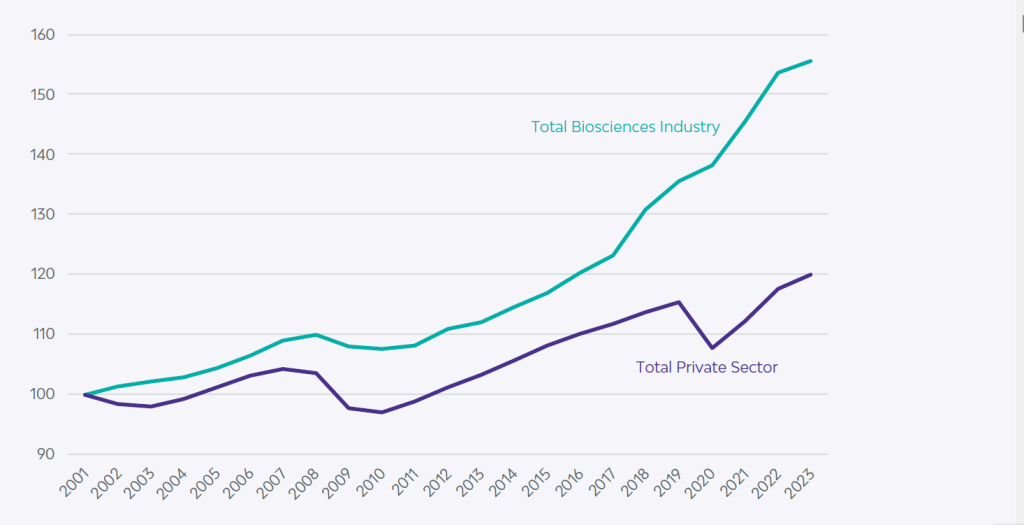Job growth, ReGen Valley TechHub grant, make New Hampshire a biosciences standout
New Hampshire’s bioscience industry is emerging as a leader, outpacing the national industry job growth rate and showing its potential with this year’s $44 million Nashua ReGen Valley TechHub grant, according to an industry report.
MANCHESTER, NH – New Hampshire’s bioscience industry is emerging as a leader, outpacing the national industry job growth rate and showing its potential with this year’s $44 million ReGen Valley TechHub grant, according to an industry report.
The state’s bioscience industry employed 9,330 across 1,048 businesses in 2023, representing a 27.9% increase since 2019, according to a report released this month from the Biotechnology Innovation Organization and the Council of State Bioscience Associations. The industry is made up of businesses that engage in advanced manufacturing, research activities, and technology services that are related to life sciences and how living organisms function in communities located in the vicinity of the Merrimack River Valley, between Manchester, NH, and Lowell, Mass.
Nationally, bioscience companies employed 2.29 million Americans across nearly 150,000 individual business establishments, a 15% increase over the past five years, according to The U.S. Bioscience Economy: Driving Economic Growth and Opportunity in States and Regions. The biennial report analyzes the industry’s overall economic impact across the country, as well as state-by-state.
New Hampshire is also singled out in the report for the $44 million TechHub grant for ReGen Valley. The grant was one of 12 awarded competitively across the country, but five, including RenGen Valley’s, were considered significantly large, according to the report. The grant is part of the $10 billion allotted by the 2022 CHIPS and Science Act in 2022, which aims to bolster the nation’s economic and national security by investing in regions that are poised to become national leaders, globally competitive in future-focused technologies and industries and driving job growth.

Members of the state’s bioscience industry also launched New Hampshire Life Sciences, an association designed to promote, educate and advance the industry in New Hampshire.
Four of the five bioscience industry subsectors in New Hampshire each comprise at least 20% of total bioscience employment in the state, and all five subsectors have had had job growth in the last five years, the report found. The subsectors are Agricultural Feedstock and Industrial Biosciences; Bioscience-Related Distribution; Medical Devices and Equipment; Pharmaceuticals; and Research, Testing and Medical Laboratories.
New Hampshire has specialized employment concentrations in two of the subsectors – Medical devices and Equipment, and Pharmaceuticals.
The average New Hampshire bioscience industry wage in 2023 was $136,164, which is 79% higher than the state’s private sector average and a little higher than the national average of $132,000 a year.
Bioscience-related academic R&D expenditures totaled $238.8 million in 2022, while National Institutes of Health funding to New Hampshire institutions was an all-time high of $127.6 million in 2023, the report said.
The report’s assessment of the state “provides further data and insight on what many in NH’s life sciences industry have known and are bearing witness to every day — our sector is diverse, robust and there is incredible opportunity for continued growth,” NHLS President and CEO Andrea Hechavarria said. “New Hampshire is an attractive destination for life sciences companies, and with continued collaboration across government, academia and the industry, there is strong potential to advance the industry even further. The economic opportunity for the Granite State is huge given our state’s proximity to Boston—the leading life sciences cluster in the world.”
Nationally, the industry had a total economic impact of $3.2 trillion on the U.S. economy in 2023, as measured by overall output, according to the report. Total economic impact since 2021 increased $350 million, or 12%. The report pointed out that while job growth remains steady nationally, and above the rest of the private sector, it leveled off to about 1.2% in 2023.
Other New Hampshire highlights of the report are:
- The state secured 399 bioscience patents in 2023, up from 325 in 2019, and is ranked sixth nationally for patents per 1 million in population, with 1,217. This is despite the fact that patents nationally leveled off in the past two years.
- The state captured approximately $388 million in bioscience-related venture capital investments over the last five years.
- The state is one of 14 states and Puerto Rico that has s specialized concentration of jobs in the medical device and equipment subsector, which includes products like bioimaging equipment, surgical supplies and instruments, orthopedic/prosthetic implants and devices, genomic sequencing equipment, automated external defibrillators, vascular stents and other implantable devices, and dental instruments and orthodontics.

